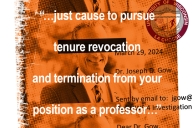You have /5 articles left.
Sign up for a free account or log in.
Bowling Green State University faculty are calling on administrators there to apologize for the role they apparently played in helping to craft a state bill that aims to greatly diminish the powers of faculty unions.
According to an investigation by The Toledo Blade, correspondence between Bowling Green administrators and legislators shows the university helped write the section of Senate Bill 5 that bans professors from collective bargaining. The bill, which more generally limits Ohio public workers’ rights to bargain, was signed into law in March after winning approval from the Republican-controlled General Assembly. It is currently on hold pending a Nov. 8 referendum vote.
Andy Schocket, director of communications for the Bowling Green State University Faculty Association, said the union would like to see the university apologize for its role and voluntarily recognize the faculty union now, meaning the union would retain collective bargaining power no matter the outcome of the Nov. 8 referendum vote.
“We’re shocked any university administration, much less a public university, much less ours, would seemingly out of vengeance not only deny us collective bargaining rights, but deny it to faculty across public institutions in Ohio,” said Schocket, a professor of history and American culture studies.
The university's actions to promote the state legislation came just months after Bowling Green faculty voted to grant collective bargaining powers to the university’s chapter of the American Association of University Professors (AAUP), a move administrators at the university had rallied against.
AAUP and the faculty union cite last year's fight as the administration’s impetus for helping members of the legislature craft Senate Bill 5. If the bill, referred to as Issue 2 in the ballot box, is approved by Ohio voters in November, any university professor who plays a role in making decisions -- such as curriculum structure, personnel matters, budget preparation -- would be barred from unionizing for collective bargaining purposes.
“I find it appalling that only months after the faculty at Bowling Green State University voted democratically to organize into a collective bargaining unit their administration would be so central in crafting the Yeshiva bill language,” said Jennifer Nichols, an AAUP organizer who has worked with the Bowling Green faculty union.
The 1980 U.S. Supreme Court decision in NLRB vs. Yeshiva is credited with exempting private institutions from eligibility for collective bargaining. The correspondence shows that the university offered the idea and language to insert the Yeshiva standard into the Ohio bill and have it apply to public institutions. University administrators admit to having had conversations with legislators, but say lawmakers would have included the Yeshiva language even if the university had not been involved in any way. Administrators also said the correspondence with legislators was not an act of retaliation against the faculty, according to the Blade investigation.
Since the bill’s passage, Bowling Green has chosen a new university president, Mary Ellen Mazey. In a statement, she said she could not comment on the past position of the university, but that she came to “Bowling Green with the understanding that our faculty had formed a union.”
“My experience at unionized institutions and with faculty negotiations was one of the reasons the BGSU Board of Trustees selected me,” she said in the statement. “One of the top priorities of my administration is to negotiate the first contract with our faculty and we have begun that process.”
David Kielmeyer, the university’s chief communication officer, said Bowling Green’s role in contributing to the bill seems to be overblown. The legislature probably would have come to the same conclusions no matter the university’s involvement, he said.
Kielmeyer said the university is not going to change its position on faculty union recognition until voters decide on the fate of the bill in November.
“We are negotiating in good faith following Ohio law,” he said. “It’s up to the voters of Ohio. Once that is resolved we will make a determination.”
Currently the university and the faculty union are negotiating contract terms. Nichols and Schocket said negotiations have moved at a snail’s pace since they began this summer. They said they hope this news helps light the fire under the university to make a good faith effort in contributing to the negotiations.
“We had a pretty resounding vote in favor of unionization,” Schocket said. “To try to overturn that secretly is pretty hurtful. It seems to be against the principles of a public university, in which we do things openly and deliberately.”
Nichols said the battle over collective bargaining power in Ohio will be telling for similar fights around the country -- if it’s successful there, she said, she has no doubt other legislatures will pass similar bills in their own states.
But for now, she said she hopes this revelation will play a big role in the Nov. 8 referendum vote.
“I think this knowledge might pull the veil from some people's eyes about the way their administration is acting, about the way politics are conducted sometimes,” she said. “I think that there’s probably going to be an escalation of pure outrage and disgust from the faculty both at Bowling Green and across the state. This was a back-room deal between the administration and a conservative legislature.”








